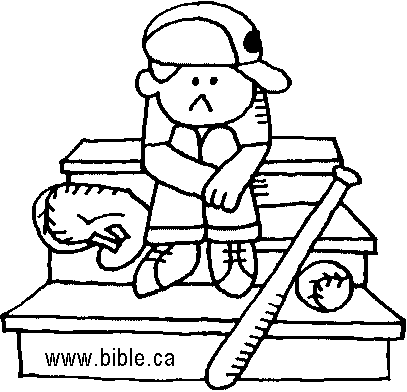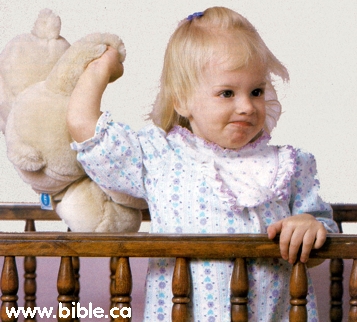How to Properly Discipline your Child The Bible Way!

|
How to Properly Discipline your Child The Bible Way! |
|
Good parents refuse to leave their children at the mercy of their own folly. Exerting every effort to prepare their children for successful living, they teach them the needful skills of self-control, respect for authority, consideration for others, and submission to God. This training involves teaching, leading, correcting. In a word, this training involves discipline.
First, effective discipline is consistent
...but it is next to impossible to be perfectly consistent. Personal feelings often spoil our efforts to be consistent. One day because mother has a headache, the child must toe the mark. The following day when everything is going well, the child can get away with anything. Fire always burns, and children learn not to touch it because it is consistently hot. A parent's "no" has meaning only if that parent is consistent, never permitting the child to ignore it.
Second, effective discipline is positive.
Discipline is not all negative. The gentle, constant pressure of a dentist's braces can re-align the teeth, likewise the steady patience of a positive parent can shape strong character in a child.
Effective discipline demands proper example. God gave a high compliment to Abraham when he said of him, "I know him, that he will command his children and his household after him, and they shall keep the way of the Lord", Genesis 18:19. This good father led by character and example. Joshua admonished Israel, "Choose you this day whom you will serve," then he added the strong words, "but as for me and my house, we will serve the Lord," Joshua 24:15. He was a successful disciplinarian of others because he was successful in self-discipline. Planting Bible principles in the heart of a child is the most reliable insurance a parent can have against disobedience and rebellion. By the time a child reaches school age, he may be spending the majority of his waking hours away from parental influence. If those first six years have been used by Godly parents to instill an awareness of God's presence and to develop a sense of right and wrong, the child is much less vulnerable to undesirable influences. The child who has been taught respect for parental authority is more likely to respect the authority of civil law and of God. He also needs to learn the discipline of work. Learning to be a responsible, productive member, of the family is important. Picking up toys and putting away clothes helps prepare the child for the responsibilities of adult life.
Third, effective discipline is individualized.
Wise parents do not compare one child to another. Children are individuals, each with strengths and weaknesses. They Find security in being loved and accepted. Even when the child is punished, he must sense that it is because he is loved. (Hebrews 12:5-6) Proper discipline must be individualized. Each situation must be seen from his view point before issuing mandates. Parents should respect a child's right to express himself, being courteous and considerate of his feelings. This is living the golden rule of Matthew 7:12.
Fourth, effective discipline is rewarding.
There may be times when discipline is met by obstinance and parents may be tempted to become soft and permissive, but what is actually needed at this time is an added measure of firmness. This temptation must be rejected if the rewards of parenthood are to be realized. Seeing children grow into Christ-like living productive adults is a rewards of carefully patterned discipline. The Bible says that children are a heritage of the Lord, like arrows in the hand of a warrior, are the sons of one's youth; Happy is the man who has a quiver full of them, he has not been put to shame, Psalms 127:3-5. Solomon said, "Train up a child in the way he should go, and when he is old he will not depart from it" Proverbs 22:6.
Proper Discipline (Part 2)
The word discipline derives from the Greek word which means "to teach". Our reducing of this good word to denote only the punishment of those who do wrong is a mistake. And the widely held notion that he is the best parent who most sternly and severely punishes his child for wrong-doing is a more serious mistake.
Wrong-doing results in harm and is therefore to be avoided. This is a lesson every child should learn. And it is necessary for a child to feel something of the ill that results from his wrong attitudes and acts. In infancy and early childhood, when reasoning powers are limited, the child may be able to understand this only when his misdeeds are immediately and sharply related to something that pains him. It is here, no doubt, that the proverbial "rod" must be applied to prevent bad attitudes and acts from becoming habits (Proverbs 13:24; 23:13).
But true discipline not only emphasizes the ill that comes from harmful acts; it also hastens to show the good effects that come from good acts and attitudes. And when the child's powers of reason are not well developed to see such natural, good effects, the wise and thoughtful parent will reward the child's good deeds with immediate and pleasant things.
True discipline is positive, as well as negative. Jesus' parable of the man from whom the demon was driven is excellent illustration (Luke 11:23-26). The demon wandered in dry places and found no home. He eventually came back to his former home to find that it was swept and garnished - but still empty! He immediately sought out other homeless demons whom he had met in his wanderings and invited them to live with him in the readied, empty heart of the man he had formerly inhabited. The man's last state was worse than the first!

That "discipline" which is concerned only with removing evil is doomed to fail. It may result in making a child good, but good for nothing! True discipline not only guards, but guides. It overcomes evil with good. Timothy was wisely disciplined in that in his childhood his mind was filled with the knowledge of the sacred Scripture (11 Timothy 3:15). Jesus at twelve years of age was committed to His father's business (Luke 2:49).
Paul refers to an attitude of some teachers who multiply rules such as "do not touch, do not taste, do not handle", which, he says, have a show of wisdom in will-worship but have no value against the indulgence of the flesh (Colossians 2:20-23). Parents may profit from this word. The truly disciplined child is not the one who knows only what not to do - rather the one who is instructed and practiced in good things to do.
Effective discipline consists not only of words and acts of correction, but also it involves instruction and exhortation to good deeds and thought. In addition to all this, the most effective discipline is a loving and patient example in all good things. Not that there is never reproof or bodily punishment; not that instruction and encouragement by word of mouth is lacking, but the teachers who are most sure of success are those whose lives are worth examples and whose love and patience inspire their discipline. Those parents who give to their children the security and joy of a home where love surrounds them, and whose words of teaching and guidance are demonstrated daily and fully in righteous, patient, unselfish service both in and out of the home, are those who truly discipline their children!